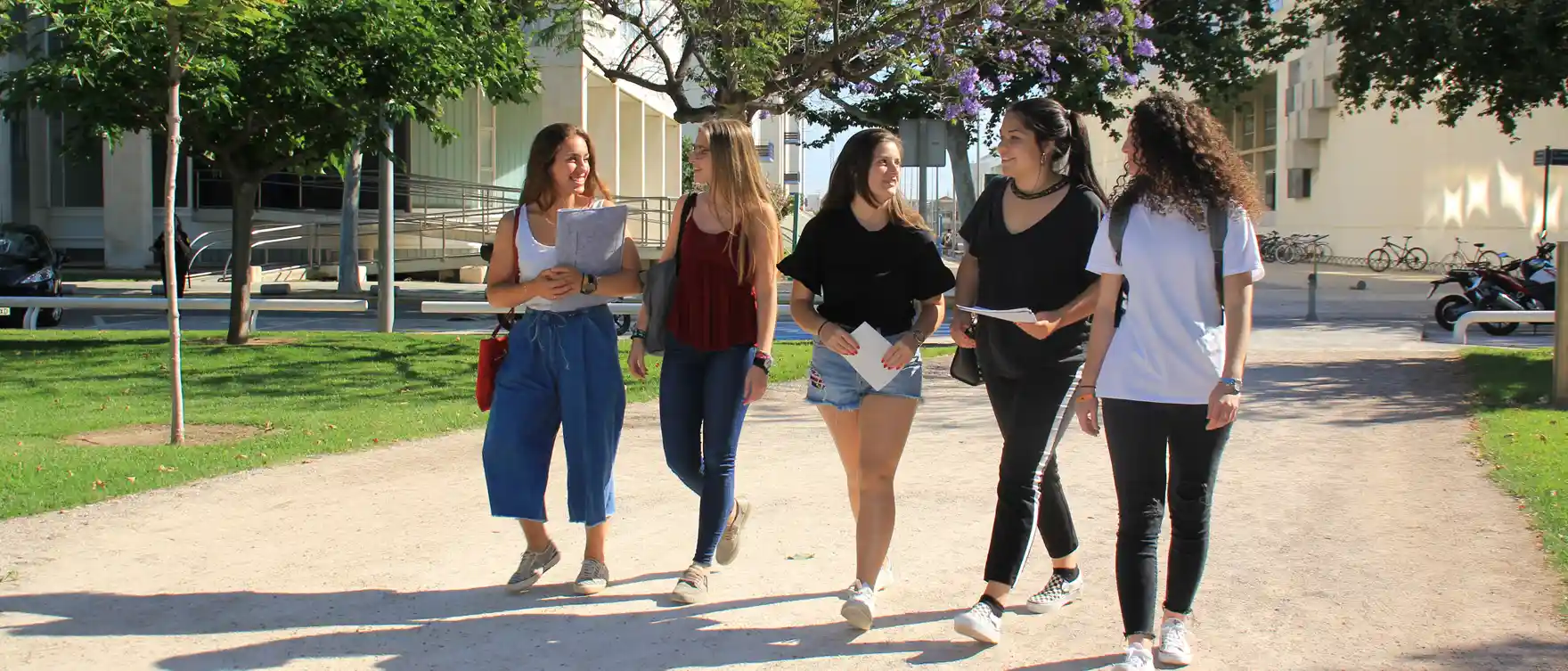Contingut de la pàgina
Title description
The main objective of the Master’s Degree is to provide the future teacher with specialized training that will enable him/her to practice teaching in Secondary Education. The Master’s Degree provides the student with the necessary competencies to exercise the teaching profession, in order to provide him/her with the knowledge, abilities and skills, teaching and learning methodologies and the necessary contact with professional practice in those subjects and modules that are associated with the specializations.
Objectives of the title

To critically observe and analyze the school context.

To understand the regulations, functioning and organization of the school center.

Design, develop and evaluate didactic interventions in the classroom.

Understanding the professional role of the teacher.

To know how to use ICT and different materials for teaching with criteria.

Acquire social skills and educational intervention competencies to perform the teaching function with quality.
Professional services
This master’s degree offers multiple professional opportunities in the educational field.
- Teacher in Compulsory Secondary Education, Baccalaureate, Vocational Training and language teaching, which are professions regulated by the Organic Law 2/2006, of May 3.
Aimed primarily at
Graduates who intend to orient their professional career in secondary education in the areas of:
- Mathematics
- Physics and Chemistry
- Economy
- Technology and Computing
- Specialty Mathematics
- Physics and Chemistry Specialty
- Economics Specialty
- Technology and Computer Science Specialty (Professional Training)
Structure of the master’s program
Credits: 60 ECTS
Compulsory:16 ects |Electives:28 ects |External practices:10 ects |Final Master’s Thesis (TFM):6 ects
Module 1. Generic :16 ects obligatory
Matter:Learning and personality development
Minimum credits: 7 | Character: Compulsory
Matter:Educational processes and contexts
Minimum credits: 4,5 | Character: Compulsory
Matter:Society, family and education
Minimum credits: 4,5 | Character: Compulsory
Module 2. Specialization in Economics :28 ects electives
Matter:Learning and Teaching Economics
Minimum credits: 9 | Character: Elective
Matter:Complements for disciplinary training in economics.
Minimum credits: 9 | Character: Elective
Matter:Teaching innovation in Economics and initiation to educational research in the classroom.
Minimum Credits: 10 | Character: Elective
Module 3. Specialization in Physics and Chemistry :28 ects electives
Matter:Learning and teaching of Physics and Chemistry
Minimum credits: 9 | Character: Elective
Matter:Complements for disciplinary training in physics and chemistry.
Minimum credits: 9 | Character: Elective
Matter:Teaching innovation in Physics and Chemistry and initiation to educational research in the classroom.
Minimum Credits: 10 | Character: Elective
Module 4. Specialization in Mathematics :28 ects electives
Matter:Learning and Teaching Mathematics
Minimum credits: 9 | Character: Elective
Matter:Complements for disciplinary training in Mathematics
Minimum credits: 9 | Character: Elective
Matter:Teaching innovation in Mathematics and initiation to educational research in the classroom.
Minimum Credits: 10 | Character: Elective
Module 5. Specialization in Technology and Computer Science :28 ects electives
Matter:Learning and teaching of Technology and Computer Technology
Minimum credits: 9 | Character: Elective
Matter:Complements for the disciplinary training in Technology and Computer Science
Minimum credits: 9 | Character: Elective
Matter:Teaching innovation in Technology and Informatics and initiation to educational research in the classroom.
Minimum Credits: 10 | Character: Elective
Module 6. Practicum :16 ects mixed
Matter:Internships in secondary schools
Minimum credits: 10 | Character: Compulsory external practice
Note: In this subject a maximum of 10 ECTS can be carried out in external curricular internships (The study plan contemplates a maximum of 10 ECTS for external curricular internships).
Matter:Master’s degree work
Minimum credits: 6 | Character: Treballe Fi Qualifications
In-company internships
The Practicum subject aims to provide students with contact with the school reality, promoting decision-making processes in teaching and learning situations, as well as promoting the acquisition of social skills and educational intervention in order to be able to respond effectively to essential questions and problems in teaching.
It is compulsory to carry out 200 hours of internships in secondary schools approved by the GVA.
Installations and laboratories
The Màster Universitari en Profesor/a de Educació Secundària is a hybrid program, which includes both face-to-face classes (40% of the total) and online classes (the remaining 60%). The face-to-face classes, which will be taught in the afternoons, in classrooms and laboratories. Part of the internships will take place in computer rooms, and others in specific areas of the center.
The computer rooms are equipped with PCs for 40 workstations each. The laboratories with special characteristics, where Physics and Chemistry and Technology and Computer Science specialties will be taught, are as follows:
- Telematics Lab.
- Lab. of Elec. Digitals
- Chemistry Lab.
- Power Electronics Lab.
For the follow-up of synchronous and differentiated non-classroom teaching, the UPV also has the Videoapuntes platform, which allows the automatic video recording of classroom lectures. There are currently two systems that allow the design and organization of online teaching materials. The first, called PoliformaT, is based on Sakai. Each subject of the curriculum has its own space accessible on the web and is accessed with username and password. The second one, called UPV medium, is based on openEDX. It is the base platform for designing Massive Open Online Courses (MOOCs of UPVx).
Finally, the complementary facilities used by the Master’s program are: Information Desk, Secretary’s Office, International Relations, Conference Room, Library, Study Rooms.

